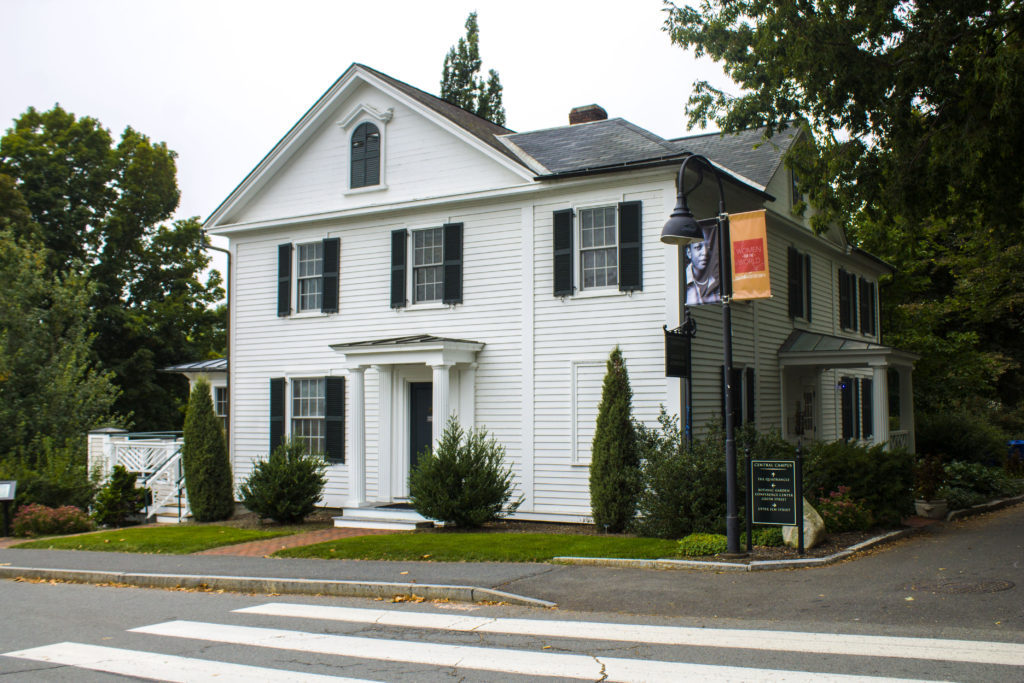Remember applying to college? I’m sure you recall the glossy promotional packets you received in the mail from schools trying to win your application. There was always a picture on the front that looked like this: a group of college age kids sitting in a circle on a lush green lawn, laughing radiantly, with suggestions of academia: notebooks, backpacks strewn around them. This image typifies the promise of the American college experience: an ideal balance of personal and intellectual fulfillment, effortless and joyful.
Colleges need applicants in order to sustain themselves. More applicants means greater selectivity, which results in an increase in prestige and desirability for the college, so the recruitment war for applicants is competitive. Private colleges are pressed to go above and beyond the simple promise of a good education in order to compete in a market of colleges with luxurious resources and privileges such as beautiful dorm rooms, incredible dining halls, state-of-the-art facilities, and ample funding for student athletics, theater, and other extracurriculars. In addition to showing off these benefits (which hike up tuition fees), colleges employ large and expensive marketing campaigns in an effort to attract applicants.
As with any advertisement, a successful college marketing campaign doesn’t just sell the school itself; it sells an idea of who you, the consumer, will become, if you buy the product (or attend the school).
But what happens when the real experience of college doesn’t live up to this utopian vision? For me, the flood of opportunities available at Smith feels overwhelming. Knowing that my four years at Smith are the biggest investment of my life, and that I’m paying for more resources than I could possibly take advantage of, results in a feeling of failure and despair. All of Smith’s incredible resources and beautiful facilities (which I see as the result of a climate in which colleges must appear not just functional but lavish in order to compete) explain our school’s cripplingly high tuition. Our school’s high tuition then puts an immense pressure on me to feel like I am having a college experience that is worth all that.
At this point, I don’t feel like I am. I am exhausted most of the time. I want to fill my schedule to the brim, squeezing every possible ounce of possibility out of Smith, but most days after I’m done with class, work and homework, I don’t have the energy to do much other than get into bed. This makes me feel guilty and terrible for not taking advantage of Smith’s myriad opportunities, which makes me sad, which further diminishes my energy … and the cycle continues.
Being unhappy in college is a struggle on its own. But being unhappy amid images and promises of the best time of your life that you’re supposed to be having creates additional strife. I have often asked myself, “What is so wrong with me, that I have managed to make something that should be so amazing so not fun?”
I was promised a sense of belonging, and I have never felt so unmoored. I was promised community and companionship, and I often feel isolated and lonely. I was sold a heroic narrative of my own college experience in which I, the protagonist, would achieve direction, intellectual growth, and self-actualization over the course of my four years at Smith. This month I turned 20. I am a junior at Smith, at the apex of this journey. I feel lost and unsure of myself.
This is not to blame the Smith institution or community for my struggles. Smith is not the cause of my oft-changed major, friend breakups, anxiety, and depression. Smith does, however, contribute to the fiction of a perfect college experience that has made me feel inadequate. Reconciling an imperfect college experience with this fiction, which college marketing teams inundate us with, creates an additional challenge for struggling students. It’s been an arduous process trying to dislodge this idealized expectation from my brain, but I believe it’s necessary to do so in order to accept my college experience for what it is and appreciate the positive elements of it. When I let go of this expectation, I think I will realize the core truth that the myth of the flawless college experience obscures: imperfection is not failure.
Phoebe Weissblum studies psychology and theater at Smith College in Northampton. She is from Gloucester. If you’d like to contact her regarding this article, you can reach her at pweissblum@smith.edu.



